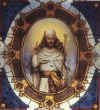|
|
||||
| Home
Feature 'Spirit of India'
Music Music
in Pakistan Health
|
|
|
||
|
the-south-asian.com April 2001 |
||||
|
Page 10 of 11
Parsis - the Zoroastrians of India by Sooni Taraporevala
Who was Zarathustra? Nearly every Parsi home has an image, always the same one, of gentle Zarathustra with long hair and a flowing beard, as imagined by a 19th century Parsi artist. Zarathustra belongs to such remote antiquity that we don't even know for certain exactly when He was born and where, much less what he looked like. But what has miraculously survived is the religion that he was inspired to reveal.
His date of birth is said to have been between 1700 and 1500 BC and it is generally believed that he was born in Eastern Iran, in what is now the Russian Steppes. Like Buddha after him, Zarathustra wanted to know the mystery of life. Why was there death and suffering in the world? What was the origin of evil? He became filled with a deep longing for justice, for a moral law that would allow mankind to lead a good life in peace. Tradition didn't provide any answers. Tradition demands its instructions to be taken on trust. He turned his back on the world and retreated to a cave on a mountain, where he meditated for ten years. Communing with nature and his inner self he finally received enlightenment from Ahura Mazda, the Wise Lord. He left his life of seclusion and descended from the mountain. He was thirty years old and brought with him a new hope, a new way of life, which still has relevance to us four thousand years later.
A life of active good towards others; people, animals, nature, is at the heart of what He taught; giving us a simple creed to follow -Humata, Hukhta, Huvarashta, Good Thoughts, Good Words, Good Deeds. "Happiness unto him who gives happiness unto others," said Zarathustra at the grey dawn of history.
The religion he revealed was based on the moral choices humans make here on earth. Every individual has the twin spirits of good and evil in their minds, that form their dual nature. When we exercise our Better Mind, we create life and draw Ahura Mazda and His Divine Powers towards ourselves. When we choose to use our Evil Mind, we enter a state of spiritual death. Confusion descends upon us and we rush towards wrath and bloodlust, by whose actions human existence is poisoned. Our duty in life is to play our part in this great cosmic battle between Good and Evil. Our individual lives are the battlefield. Every decision we make, every choice of thought, word and deed, adds up.
It is perhaps difficult to appreciate the originality and courage of Zarathustra's thought today. So many prophets have come after him with similar proclamations. But if we place ourselves into the antiquity in which he lived, Zarathustra's religion was radically different to anything mankind had ever dreamt of thus far. Instead of a religion based on fear, Zarathustra's religion put a free, thinking, rational mind on centrestage. "Zoroastrianism," writes the scholar, R. C. Zaehner, "is the religion of free will par excellence."
According to Zarathustra, salvation for the individual depends on the sum of his/her thoughts, words and deeds and there can be no intervention by any divine being to alter this. No costly material sacrifices or rituals will change the way the individual is judged. Making our own choices, we alone have to bear the responsibility for our own souls. Later religions, Judaism, Christianity, Islam, all borrowed freely from His teachings. But while they grew to attract millions of believers, the oldest prophet of them all retreated into obscurity, remembered only by scholars of religion and we - his followers.It is believed that the years he spent preaching amongst his own people were almost fruitless, bringing him only one convert, his cousin. So he departed and went to another tribe, where being a stranger, he was granted an audience with King Vishtaspa who became an ardent follower. And from there the religion spread.What we know about Zarathustra comes primarily from the Gathas, seventeen great hymns which he composed. These are not works of instruction, but inspired, passionate, poetic utterances, many of them addressed directly to God in a language that became extinct thousands of years ago. Tradition credits Zarathustra with having composed profusely. Pliny states that the great philosopher Hermippus, who lived in 3BC had studied 2,000,000 verses composed by Him. Arab historians state that Zoroastrian texts were copied on 12,000 cowhides. Parsi tradition speaks of 21 nasks or volumes containing 345,700 words. Out of this, what has survived is a fraction of what was originally there, a mere 83,000 words. These 83,000 words make up our prayers, collectively called the Avesta. Though most of us have no idea what we are praying, yet we have prayed these same prayers in an unbroken continuum from 1500BC. Scholars, linguists, priests have translated the Gathas, but the devout have no need for translations; the words of the prayers are like old friends-rhythms that have been there since childhood, intimate companions. Extracted
from the book
Nietzsche's tome, "Thus Spake Zarathustra" had nothing to do with the Prophet Zarathustra
Parsis - The Zoroastrians of India Arrival in India and the beginnings of a new life The Early Entrepreneurs of Bombay
|
||||
| Copyright © 2000 [the-south-asian.com]. Intellectual Property. All rights reserved. | ||||
| Home |
